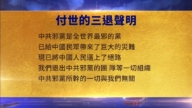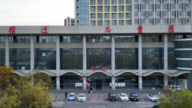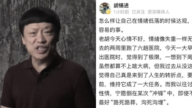【新唐人2011年9月10日讯】在中国内外批评中宣部严控网络讯息与限制传媒报导的声浪中,中宣部长刘云山表示,中宣部不可能完全管理五亿网民,中国面临网络管理的危机。对此,日本媒体认为,刘云山的发言,显示中共将以新的措施来限制网络自由。
参加了在长春举行4天的“中日韩媒体圆桌论坛”的多个日韩传媒记者,9月7号,与中共中宣部长刘云山在北京人民大会堂举行了会谈。会谈中,刘云山表示,“中宣部不可能完全管理五亿网民,中国(共)被说成严格管理网络,其实很难,中国(共)面临网络管理的危机。”
浙江民主人士邹巍表示,大陆的网路限制是众所周知的事实,但是互联网在发展,中共想控制已经是不可能的事情。
邹巍:“从思想的控制的程度来说,网络的控制,包括各种限制措施,那只能说是在设置障碍,但是要彻底的切断信息自由的传播,控制人的思想,从长远来说,那是根本做不到的。”
邹巍认为,对思想、对网络的控制最终只会失败。所以,中共网络控制面临着的危机将会成为事实。
日本销量最大的报纸《读卖新闻》报导,中国有五亿网民,超出了原来一般预计的三亿数字。所以,中宣部禁止批评中共政权的言论不时能在网络上看到。不过,刘云山的发言,显示中共将以新的法律措施来限制网络自由。
中国公民记者 周曙光:“因为,你知道中国是一个一党专政的国家,在这种情况下,它对意识形态统一,它就非常看重。所以,一旦意识形态出现一些分化,或者波动的话,显然会影响共产党的执政地位。所以,它强调这种一元化的意识形态,所以它们对多元化的这种价值观、思想意识形态,它们是感觉到有些威胁的。所以它就一直控制网络,然后来保卫它的这种执政地位。”
《自由亚洲电台》表示,刘云山不满外界对中宣部的批评,但他显然也承认中宣部意在管理网民。
周曙光指出,中国一些互动效果好的网站,花费很多精力去协助中共的网络审查内容,直接影响网站的创新能力,把一些开放的网站变成封闭的网站。中国网民希望改变这种体制,把网络管理透明化。
美国托莱多大学荣誉退休教授冉伯恭表示,网络管理确实对中共构成挑战。他希望中共政府改变过去压制不同意见的政策。
《法新社》评论说,北京有意通过加强对拥有众多用户的微博平台的控制,来遏止网上的批评浪潮﹔微博的异军突起对管制者构成了严峻挑战。
上个月,大陆微博有关“对抗中共封杀”的顺口溜爆红网络。原因是7.23温州动车追尾事件,中共中宣部下达新闻禁令,尽管大陆媒体出现了史上抗命潮,但很多媒体不敢客观报导动车事件。在这个过程中,微博起到正面的作用,让世界见证了这次惨案的真实状况。不过,很快微博上的新闻遭到了中共的封杀。为此,微博改变了常规,以嘻笑怒骂、打油诗、顺口溜的方式,影射大陆的一些真实事件,因此在网上顺利传播。
如,对联上联:“干爹干妈干女儿.红楼红歌红十字”﹔下联:“动车动人动鬼神.铁面铁心铁道部”。横批是“无真相”。
新唐人记者唐睿、郭敬采访报导。
The CCP Faces Internet Control Crisis
In the wave of criticism regarding Chinese authorities’ strict
control over Internet communication and media coverage,
director of the Central Propaganda Department of Chinese
Communist Party (CCP), Liu Yunshan, said that
the Central Propaganda Department cannot completely
regulate China’s 0.5 billion netizens,
and now faces an internet control crisis.
Japanese media analyzed that Liu Yunshan’s statement
shows that new measures will be taken by the CCP
to restrict internet freedom.
After four days of the China-Japan-South Korea media
roundtable meeting in Changchun City,
several journalists from Japan and Korea held talked with
Liu Yunshan on September 7.
Liu said, “It’s impossible to completely regulate 0.5 billion
netizens. The internet in China was said to be strictly
regulated, this in fact is always very hard to achieve.
So now China is facing an internet regulation crisis.”
Zou Wei, democrat from Zhengjiang, said that it is known to
all that the CCP authorities’ restrict the Internet.
As the Internet continues to develop, the CCP wants to take
overall control, but that’s impossible.
Zou Wei: In terms of the extent of control over people’s
minds and over the Internet,
including various kinds of restrictions,
all this is merely the government setting up obstacles.
If the authorities want to thoroughly restrict the freedom of
information communication to further control people’s minds,
it won’t work in the long run.”
Zou Wei believes that the CCP authorities’ control over
people’s thinking and the internet will end in failure.
So, an internet control crisis will take place.
Japan’s top-selling newspaper Yomiuri Shimbun reported
that China has 0.5 billion netizens,
exceeding the original estimated figure of 0.3 billion.
So, criticism of the CCP, which was banned by the Central
Propaganda Department, appears online from time to time.
However, Liu Yunshan’s speech shows that the CCP will
take new legal measures to restrict internet freedom.
Citizen journalist Zhou Shuguang: China is a one-party
dictatorship, the authorities stress ideological unification.
So, once there are some diversions away from the CCP’s
ideology or disturbances,
it will obviously affect the CCP’s ruling position.
The CCP stresses such a unified ideology.
So, naturally, it regards diversified values and ideologies
as a threat. That’s why it has been controlling China’s internet.
This is a means to secure its ruling.”
Radio Free Asia (RFA) comments that Liu Yunshan is
dissatisfied with outside criticism.
However, he apparently acknowledges that the Central
Propaganda Department intends to regulate the netizens.
Zhou Shuguang points out that in China,
there are some good interactive websites.
They spend a lot of effort to
corroborate the CCP’s censorship of content.
This directly affects the site’s innovation ability,
turning some open-minded sites into enclosed sites.
Chinese netizens want to change this system,
and look forward to transparent Internet regulation.
A retired professor at University of Toledo, Ran Bogong,
said that the internet regulation does challenge the CCP.
He hoped that the CCP authorities
can change the policy of suppressing different views.
AFP comments that the Beijing regime intends to step up
control over microblogs to curb the wave of criticism
at home and abroad. The sudden popularity of microblogs
constitutes a serious challenge to the CCP.
Last month, patter about rebelling against the CCP’s
blockage became popular in the microblogs.
The reason is that after the Wenzhou Train Crash, CCP’s
Propaganda Department banned the media from reporting.
Despite several medias displaying disobedience for the first
time in history, many medias still dared not to do reports.
However, microblogs played a positive role,
making the world witness the true situation of the tragedy.
The news in the microblogs was soon censored
by the CCP authorities.
This made the microblogs change the routine writing style,
netizens now use satires, doggerels or patterns to insinuate
disdain for real events that happened in China.
In this way, the message is spread despite the censorship.
For instance, a couplet’s first line is “Godfather, Godmother,
God-daughter; Red mansion, Red Song, Red Cross”
Second line is “ Moving train, moving the people,
moving the spirits; iron face, iron heart, iron Rail Ministry”
The couplet’s streamer is “No Truth."
NTD reporters Tang Rui and Guo Jing



























